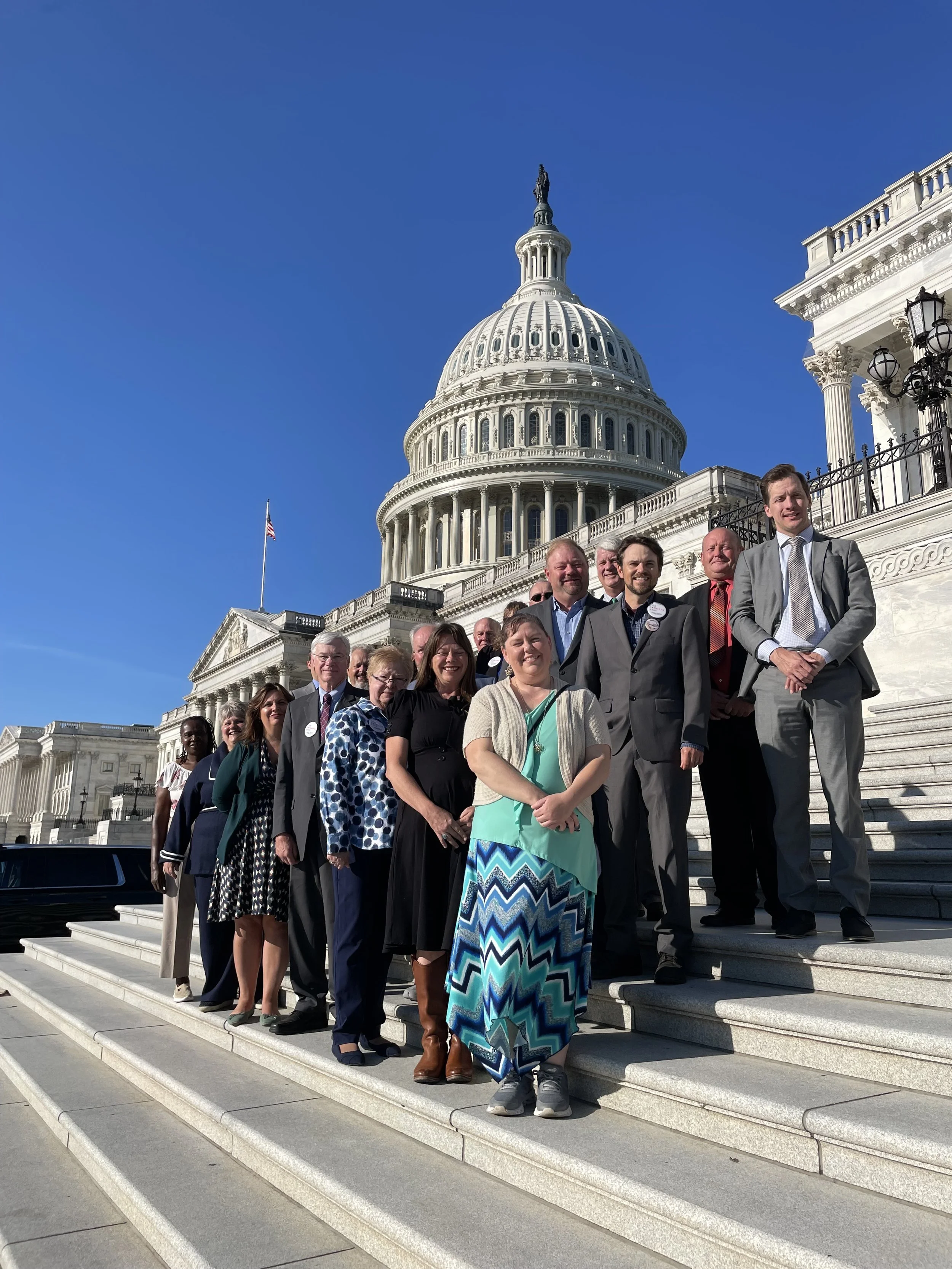Recap: Lobbyist for A Day
I’m back from my trip to Washington D.C. to help the Minnesota Farmers Union lobby for policies that benefit farmers and rural America. Politics has been a touchy subject for quite some time and I’m guessing this blog post might stir up some feelings or opinions and even disagreements. I’m hoping to write from a place of fact or at least facts as I understand them. Feel free to disagree with me and the Minnesota Farmers Union about what policy priorities for farmers and rural America should be. In fact, I’d love to hear your take because I bet I can learn something from you!
I went as part of the Minnesota delegation for the Minnesota Farmers Union which is part of the larger National Farmers Union. Their slogan is “for farmers sake” but really it should be “for everyone's sake”. After all, the slogan “Agriculture is the foundation of manufacture and commerce” was one of the first things I saw as I entered the USDA building. Without agriculture cities aren’t possible and we’d all be back to hunter-gatherers.
I’ll summarize the main policy priorities we had briefly below:
Restore Local Food Procurement Programs. The now defunded Local Foods Purchase Assistant program was incredibly popular across the country and even across political ideology. We advocate for a house and senate bill introduced with bi-partisan support to restore funding for a replacement program.
Break Up Corporate Ag Monopolies. Did you know that just 4 companies control something like 80% of all beef, pork and poultry processed in this country? They disguise this by selling their products under different brand names and different labels giving the illusion of choice.
Pass A Farm Bill. The Farm Bill is a collection of programs that benefit farmers, rural communities and folks experiencing food insecurity. The farm bill includes things like SNAP (food stamps), crop insurance and conservation programs.
Tariffs/Trade Policy. End blanket tariffs.
Biofuels. Expand use of ethanol and biodiesel with a nationwide E15 program.
Meat Labeling. Country of origin labeling for meat. Not everything labeled “product of USA” is an animal that was grown or raised in the USA.
Before I get into my take on these policy priorities and reflections I wanted to just say that the Minnesota Farmers Union delegation I was a part of was a diverse mix of growers. There were several vegetable growers, livestock producers, cut flower producers and more. That’s something I really like about farmers union: we’re a diverse mix of growers advocating for farm policies that work for all farmers.
We met with either the congressional members themselves or their staffers and in some cases both. I personally met senators Amy Klobuchar and Tina Smith as well as representatives Angie Craig, Kelly Morrison, and Betty McCollum. I also met with a staffer from representative Brad Finstad who is my representative here in district 1. Our group also split up so we could meet with staffers from Ilhan Omar, Tom Emmer and Michelle Fischbach’s offices respectively.
Here are my take-aways from the meetings. First, the meetings are so short and so brief that it’s really hard to dive into the nuance and details of various policy issues. Democratic representatives seemed largely supportive of our overall policies priorities while Republican representatives were more muted in their responses. Reading between the lines we know Republican representatives see the problem brewing in the rural economy but they were very hesitant to offer up solutions.
Another takeaway is that it seems there is bi-partisan support for enacting a Local Foods Procurement Program similar to the Local Foods Purchasing Assistance Program that was canceled under the Trump administration. There are currently bi-partisan bills in both the house and the senate that would re-create this program.
A third takeaway is that both Republicans and Democrats recognize the problem tariffs have created for farmers. The problem boils down to this: China buys basically 1 out of every 3 rows of soybeans produced in the United States. Further, China buys a large amount of pork (which is fed crushed soybeans) from the United States. Usually, by this time of year contracts are signed for China to buy a certain amount of soybeans but this year there are no contracts. Soybean prices, and most commodity prices in general are depressed.
Democrats see this as a self-inflicted wound while Republicans are both hopeful a better trade deal will come and also recognize that a single buyer, China, buying that large of a percentage of U.S. commodities is a weakness and that we should diversify our exports. I think both are right, it's just too bad it’s coming at the farmers profit.
Both Republicans and Democrats are skeptical that a farm bill will be passed by the end of the year. Tina Smith described the farm bill as the “grand bargain” where democrats who support strong social safety nets through the SNAP program and republicans who support a strong farmer safety net could come together to pass a bi-partisan bill. The problem is that Republicans drastically cut SNAP benefits in the One Big Beautiful Bill Act without Democrat support through the reconciliation process. Both Representative Angie Craig who is ranking member on the House Ag Committee and Amy Klobuchar who’s on the Senate Ag Committee foresee difficulty getting democratic support for a farm bill because democrats will be unwilling to vote on anything that doesn’t restore SNAP benefits. Likewise, some republicans will be unwilling to vote on a farm bill that includes SNAP benefits due to budget concerns.
My own view is that it was either incredibly short sighted for Republicans to vote to cut SNAP and expect to pass a farm bill in the future OR that Republicans really don’t care about passing a farm bill. Given the muted response overall from Republican staffers it seems to me that this whole farm economy is designed to bankrupt the small commodity farmers. The big will get bigger and the small will whither.
Our farm, Cedar Crate Farm, is lucky. We are not reliant on government programs like subsidized crop insurance or direct payments from the government. We can’t be forced out of the market by low commodity prices, a lack of an adequate farm bill (which really doesn’t do much for us), or slow government payments. Despite direct marketing being significantly more work we largely operate outside the government agricultural system which gives us a good bit of resilience when it comes to poor trade policy and congressional infighting. One tidbit I picked up that I find interesting is that a commodity farmer that was on the fly-in with me shared that about 25% of their gross farm income comes from direct government payments. And remember, that doesn’t include crop insurance premium subsidies.
The last thing I’ll hit on is bio fuels. My initial reaction is that biofuels are not the best idea ever. It seems like we as a country are over producing commodities and trying to drum up new ways to use these commodities by subsidizing new markets. If gallon for gallon ethanol and gasoline were equal it might be a different story but my own experience is that I see a 10-30% reduction in mileage in my vehicle when I use the highest ethanol blend my vehicle supports. I do see how a gallon of ethanol is more environmentally friendly than a gallon of gasoline since there’s some amount of carbon that’s offset in the production of ethanol. That said, the biofuel issue is not a hill I would die on and if it helps my neighbors then it is something we might as well do.
I walk away from this fly-in and my experience in Washington D.C. with a mix of feelings. First, I feel a little more patriotic than before not only being in DC but also participating directly in the democratic process at the federal level. It’s hard to be in DC and not feel patriotic. Conversely, I feel pessimistic about Democrats and Republicans coming together to work on policies that benefit farmers and rural America. I feel proud that my farm is able to function without government support. I feel jealous that commodity producers get so much government support. The experience was intense and intimidating but I learned so much. I’m grateful for the opportunity and was glad I had a chance to make my voice heard.

